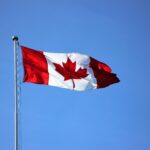The Unprecedented Decline of the U.S. Passport: What It Means for Global Travel
One of the most startling revelations from the recent Henley Passport Index reports is the consistent downward trend of the United States passport. While still a strong travel document, its slide from a top-tier position over the past decade is significant. In the 2025 index, the U.S. shares the 8th position with Canada, but its trajectory tells a different story. Just a decade ago, the U.S. passport was among the most powerful in the world. Its current ranking represents its lowest point in nearly two decades, a noteworthy shift in the landscape of global mobility. Experts analyzing the data suggest this decline is not due to new visa restrictions being placed on American citizens, but rather a stagnation in its own visa-waiver policies. As other countries, particularly those in Europe and Asia, have actively pursued and secured more reciprocal visa-waiver agreements for their citizens, the U.S. has remained relatively static. This has allowed other nations to climb the rankings while the U.S. has effectively been overtaken. This development in the Canada vs US passport comparison underscores a divergence in diplomatic strategy and highlights Canada’s continued success in maintaining and expanding visa-free access for its citizens, solidifying its reputation as a more open and globally integrated nation.
The Pathway to a Powerful Canadian Passport: Key Citizenship Requirements
Acquiring a Canadian passport is the final and most rewarding step in the journey to becoming a full-fledged citizen of Canada. The pathway to this goal is clearly defined and managed by Immigration, Refugees and Citizenship Canada (IRCC). The process begins with obtaining permanent resident (PR) status. Once an individual is a permanent resident, they must meet several key criteria to be eligible to apply for citizenship. The most critical of these is the physical presence requirement. An applicant must have been physically present in Canada for at least 1,095 days (three years) during the five years immediately before the date of their application. This rule ensures that prospective citizens have established significant residential ties to the country. Furthermore, applicants must demonstrate their commitment to Canada by filing income taxes for at least three of the five years, if required to do so. Proficiency in one of Canada’s official languages, English or French, is another essential pillar of the application. Applicants between the ages of 18 and 54 must provide proof of their language skills. Finally, these same applicants must pass a citizenship test, which assesses their knowledge of Canada’s history, geography, government, and the rights and responsibilities of a citizen. Successfully navigating these requirements is the gateway to obtaining Canadian citizenship and, with it, one of the world’s most valuable and respected travel documents.
Frequently Asked Questions
What is the Henley Passport Index?
The Henley Passport Index is a globally recognized system that ranks 199 different passports based on the number of destinations their holders can access without a prior visa. It uses exclusive data from the International Air Transport Authority (IATA) to provide the most authoritative ranking of global travel freedom.
How powerful is the Canadian passport according to the 2025 ranking?
The Canadian passport is ranked among the top 10 most powerful in the world. It provides its holders with visa-free or visa-on-arrival access to 185 international destinations, signifying exceptional global mobility.
What has caused the U.S. passport to drop in the rankings?
The decline of the U.S. passport’s ranking is largely attributed to its stagnation in securing new reciprocal visa-waiver agreements. As other countries have expanded their visa-free access, the U.S. has not kept pace, causing it to fall behind in the global standings.
What are the main requirements to become a Canadian citizen?
To become a Canadian citizen, an applicant must first be a permanent resident. They must then meet a physical presence requirement of being in Canada for at least 1,095 days in the last five years, file income taxes, prove proficiency in English or French, and pass a citizenship test.
What are the benefits of a Canadian passport beyond travel?
Beyond visa-free travel, Canadian citizenship grants the right to vote and run for political office, the ability to work in high-security government jobs, and the peace of mind that comes with robust consular support from Canadian embassies worldwide.
Talk to us to find out more. ->
The content above is not intended to provide legal advice or opinions of any kind and may not be used for professional or commercial purposes.
Exceptional Global Mobility: The ability to travel to 185 destinations without a prior visa is a primary benefit, offering immense flexibility and freedom.Economic Opportunity: Citizenship grants the unrestricted right to work in any profession and in any province or territory in Canada, including sensitive government positions that are off-limits to non-citizens.Political Participation: As a citizen, one gains the fundamental right to vote in federal, provincial, and municipal elections and even run for political office, thereby having a direct say in the country’s future.Security and Stability: A Canadian passport provides the security of living in a politically stable and economically prosperous country, with access to robust consular assistance from Canadian embassies and consulates around the world.Citizenship for Future Generations: Canadian citizenship can typically be passed down to children born abroad, securing these invaluable benefits for one’s family for generations to come.The Unprecedented Decline of the U.S. Passport: What It Means for Global Travel
One of the most startling revelations from the recent Henley Passport Index reports is the consistent downward trend of the United States passport. While still a strong travel document, its slide from a top-tier position over the past decade is significant. In the 2025 index, the U.S. shares the 8th position with Canada, but its trajectory tells a different story. Just a decade ago, the U.S. passport was among the most powerful in the world. Its current ranking represents its lowest point in nearly two decades, a noteworthy shift in the landscape of global mobility. Experts analyzing the data suggest this decline is not due to new visa restrictions being placed on American citizens, but rather a stagnation in its own visa-waiver policies. As other countries, particularly those in Europe and Asia, have actively pursued and secured more reciprocal visa-waiver agreements for their citizens, the U.S. has remained relatively static. This has allowed other nations to climb the rankings while the U.S. has effectively been overtaken. This development in the Canada vs US passport comparison underscores a divergence in diplomatic strategy and highlights Canada’s continued success in maintaining and expanding visa-free access for its citizens, solidifying its reputation as a more open and globally integrated nation.
The Pathway to a Powerful Canadian Passport: Key Citizenship Requirements
Acquiring a Canadian passport is the final and most rewarding step in the journey to becoming a full-fledged citizen of Canada. The pathway to this goal is clearly defined and managed by Immigration, Refugees and Citizenship Canada (IRCC). The process begins with obtaining permanent resident (PR) status. Once an individual is a permanent resident, they must meet several key criteria to be eligible to apply for citizenship. The most critical of these is the physical presence requirement. An applicant must have been physically present in Canada for at least 1,095 days (three years) during the five years immediately before the date of their application. This rule ensures that prospective citizens have established significant residential ties to the country. Furthermore, applicants must demonstrate their commitment to Canada by filing income taxes for at least three of the five years, if required to do so. Proficiency in one of Canada’s official languages, English or French, is another essential pillar of the application. Applicants between the ages of 18 and 54 must provide proof of their language skills. Finally, these same applicants must pass a citizenship test, which assesses their knowledge of Canada’s history, geography, government, and the rights and responsibilities of a citizen. Successfully navigating these requirements is the gateway to obtaining Canadian citizenship and, with it, one of the world’s most valuable and respected travel documents.
Frequently Asked Questions
What is the Henley Passport Index?
The Henley Passport Index is a globally recognized system that ranks 199 different passports based on the number of destinations their holders can access without a prior visa. It uses exclusive data from the International Air Transport Authority (IATA) to provide the most authoritative ranking of global travel freedom.
How powerful is the Canadian passport according to the 2025 ranking?
The Canadian passport is ranked among the top 10 most powerful in the world. It provides its holders with visa-free or visa-on-arrival access to 185 international destinations, signifying exceptional global mobility.
What has caused the U.S. passport to drop in the rankings?
The decline of the U.S. passport’s ranking is largely attributed to its stagnation in securing new reciprocal visa-waiver agreements. As other countries have expanded their visa-free access, the U.S. has not kept pace, causing it to fall behind in the global standings.
What are the main requirements to become a Canadian citizen?
To become a Canadian citizen, an applicant must first be a permanent resident. They must then meet a physical presence requirement of being in Canada for at least 1,095 days in the last five years, file income taxes, prove proficiency in English or French, and pass a citizenship test.
What are the benefits of a Canadian passport beyond travel?
Beyond visa-free travel, Canadian citizenship grants the right to vote and run for political office, the ability to work in high-security government jobs, and the peace of mind that comes with robust consular support from Canadian embassies worldwide.
Talk to us to find out more. ->
The content above is not intended to provide legal advice or opinions of any kind and may not be used for professional or commercial purposes.
- Exceptional Global Mobility: The ability to travel to 185 destinations without a prior visa is a primary benefit, offering immense flexibility and freedom.Economic Opportunity: Citizenship grants the unrestricted right to work in any profession and in any province or territory in Canada, including sensitive government positions that are off-limits to non-citizens.Political Participation: As a citizen, one gains the fundamental right to vote in federal, provincial, and municipal elections and even run for political office, thereby having a direct say in the country’s future.Security and Stability: A Canadian passport provides the security of living in a politically stable and economically prosperous country, with access to robust consular assistance from Canadian embassies and consulates around the world.Citizenship for Future Generations: Canadian citizenship can typically be passed down to children born abroad, securing these invaluable benefits for one’s family for generations to come.
The Unprecedented Decline of the U.S. Passport: What It Means for Global Travel
One of the most startling revelations from the recent Henley Passport Index reports is the consistent downward trend of the United States passport. While still a strong travel document, its slide from a top-tier position over the past decade is significant. In the 2025 index, the U.S. shares the 8th position with Canada, but its trajectory tells a different story. Just a decade ago, the U.S. passport was among the most powerful in the world. Its current ranking represents its lowest point in nearly two decades, a noteworthy shift in the landscape of global mobility. Experts analyzing the data suggest this decline is not due to new visa restrictions being placed on American citizens, but rather a stagnation in its own visa-waiver policies. As other countries, particularly those in Europe and Asia, have actively pursued and secured more reciprocal visa-waiver agreements for their citizens, the U.S. has remained relatively static. This has allowed other nations to climb the rankings while the U.S. has effectively been overtaken. This development in the Canada vs US passport comparison underscores a divergence in diplomatic strategy and highlights Canada’s continued success in maintaining and expanding visa-free access for its citizens, solidifying its reputation as a more open and globally integrated nation.
The Pathway to a Powerful Canadian Passport: Key Citizenship Requirements
Acquiring a Canadian passport is the final and most rewarding step in the journey to becoming a full-fledged citizen of Canada. The pathway to this goal is clearly defined and managed by Immigration, Refugees and Citizenship Canada (IRCC). The process begins with obtaining permanent resident (PR) status. Once an individual is a permanent resident, they must meet several key criteria to be eligible to apply for citizenship. The most critical of these is the physical presence requirement. An applicant must have been physically present in Canada for at least 1,095 days (three years) during the five years immediately before the date of their application. This rule ensures that prospective citizens have established significant residential ties to the country. Furthermore, applicants must demonstrate their commitment to Canada by filing income taxes for at least three of the five years, if required to do so. Proficiency in one of Canada’s official languages, English or French, is another essential pillar of the application. Applicants between the ages of 18 and 54 must provide proof of their language skills. Finally, these same applicants must pass a citizenship test, which assesses their knowledge of Canada’s history, geography, government, and the rights and responsibilities of a citizen. Successfully navigating these requirements is the gateway to obtaining Canadian citizenship and, with it, one of the world’s most valuable and respected travel documents.
Frequently Asked Questions
What is the Henley Passport Index?
The Henley Passport Index is a globally recognized system that ranks 199 different passports based on the number of destinations their holders can access without a prior visa. It uses exclusive data from the International Air Transport Authority (IATA) to provide the most authoritative ranking of global travel freedom.
How powerful is the Canadian passport according to the 2025 ranking?
The Canadian passport is ranked among the top 10 most powerful in the world. It provides its holders with visa-free or visa-on-arrival access to 185 international destinations, signifying exceptional global mobility.
What has caused the U.S. passport to drop in the rankings?
The decline of the U.S. passport’s ranking is largely attributed to its stagnation in securing new reciprocal visa-waiver agreements. As other countries have expanded their visa-free access, the U.S. has not kept pace, causing it to fall behind in the global standings.
What are the main requirements to become a Canadian citizen?
To become a Canadian citizen, an applicant must first be a permanent resident. They must then meet a physical presence requirement of being in Canada for at least 1,095 days in the last five years, file income taxes, prove proficiency in English or French, and pass a citizenship test.
What are the benefits of a Canadian passport beyond travel?
Beyond visa-free travel, Canadian citizenship grants the right to vote and run for political office, the ability to work in high-security government jobs, and the peace of mind that comes with robust consular support from Canadian embassies worldwide.
Talk to us to find out more. ->
The content above is not intended to provide legal advice or opinions of any kind and may not be used for professional or commercial purposes.
- Exceptional Global Mobility: The ability to travel to 185 destinations without a prior visa is a primary benefit, offering immense flexibility and freedom.Economic Opportunity: Citizenship grants the unrestricted right to work in any profession and in any province or territory in Canada, including sensitive government positions that are off-limits to non-citizens.Political Participation: As a citizen, one gains the fundamental right to vote in federal, provincial, and municipal elections and even run for political office, thereby having a direct say in the country’s future.Security and Stability: A Canadian passport provides the security of living in a politically stable and economically prosperous country, with access to robust consular assistance from Canadian embassies and consulates around the world.Citizenship for Future Generations: Canadian citizenship can typically be passed down to children born abroad, securing these invaluable benefits for one’s family for generations to come.
The Unprecedented Decline of the U.S. Passport: What It Means for Global Travel
One of the most startling revelations from the recent Henley Passport Index reports is the consistent downward trend of the United States passport. While still a strong travel document, its slide from a top-tier position over the past decade is significant. In the 2025 index, the U.S. shares the 8th position with Canada, but its trajectory tells a different story. Just a decade ago, the U.S. passport was among the most powerful in the world. Its current ranking represents its lowest point in nearly two decades, a noteworthy shift in the landscape of global mobility. Experts analyzing the data suggest this decline is not due to new visa restrictions being placed on American citizens, but rather a stagnation in its own visa-waiver policies. As other countries, particularly those in Europe and Asia, have actively pursued and secured more reciprocal visa-waiver agreements for their citizens, the U.S. has remained relatively static. This has allowed other nations to climb the rankings while the U.S. has effectively been overtaken. This development in the Canada vs US passport comparison underscores a divergence in diplomatic strategy and highlights Canada’s continued success in maintaining and expanding visa-free access for its citizens, solidifying its reputation as a more open and globally integrated nation.
The Pathway to a Powerful Canadian Passport: Key Citizenship Requirements
Acquiring a Canadian passport is the final and most rewarding step in the journey to becoming a full-fledged citizen of Canada. The pathway to this goal is clearly defined and managed by Immigration, Refugees and Citizenship Canada (IRCC). The process begins with obtaining permanent resident (PR) status. Once an individual is a permanent resident, they must meet several key criteria to be eligible to apply for citizenship. The most critical of these is the physical presence requirement. An applicant must have been physically present in Canada for at least 1,095 days (three years) during the five years immediately before the date of their application. This rule ensures that prospective citizens have established significant residential ties to the country. Furthermore, applicants must demonstrate their commitment to Canada by filing income taxes for at least three of the five years, if required to do so. Proficiency in one of Canada’s official languages, English or French, is another essential pillar of the application. Applicants between the ages of 18 and 54 must provide proof of their language skills. Finally, these same applicants must pass a citizenship test, which assesses their knowledge of Canada’s history, geography, government, and the rights and responsibilities of a citizen. Successfully navigating these requirements is the gateway to obtaining Canadian citizenship and, with it, one of the world’s most valuable and respected travel documents.
Frequently Asked Questions
What is the Henley Passport Index?
The Henley Passport Index is a globally recognized system that ranks 199 different passports based on the number of destinations their holders can access without a prior visa. It uses exclusive data from the International Air Transport Authority (IATA) to provide the most authoritative ranking of global travel freedom.
How powerful is the Canadian passport according to the 2025 ranking?
The Canadian passport is ranked among the top 10 most powerful in the world. It provides its holders with visa-free or visa-on-arrival access to 185 international destinations, signifying exceptional global mobility.
What has caused the U.S. passport to drop in the rankings?
The decline of the U.S. passport’s ranking is largely attributed to its stagnation in securing new reciprocal visa-waiver agreements. As other countries have expanded their visa-free access, the U.S. has not kept pace, causing it to fall behind in the global standings.
What are the main requirements to become a Canadian citizen?
To become a Canadian citizen, an applicant must first be a permanent resident. They must then meet a physical presence requirement of being in Canada for at least 1,095 days in the last five years, file income taxes, prove proficiency in English or French, and pass a citizenship test.
What are the benefits of a Canadian passport beyond travel?
Beyond visa-free travel, Canadian citizenship grants the right to vote and run for political office, the ability to work in high-security government jobs, and the peace of mind that comes with robust consular support from Canadian embassies worldwide.
Talk to us to find out more. ->
The content above is not intended to provide legal advice or opinions of any kind and may not be used for professional or commercial purposes.
Table of Contents
- Decoding the Henley Passport Index 2025: A Global Mobility Benchmark
Canada’s Elite Standing: Analyzing the Benefits of a Top-Tier Passport
The Unprecedented Decline of the U.S. Passport: What It Means for Global Travel
The Pathway to a Powerful Canadian Passport: Key Citizenship Requirements
Frequently Asked Questions
Decoding the Henley Passport Index 2025: A Global Mobility Benchmark
Each year, global citizens, frequent travelers, and prospective immigrants look to the Henley Passport Index as the definitive ranking of passport strength worldwide. This esteemed index provides a comprehensive assessment of global travel freedom, meticulously evaluating passports from 199 different countries against 227 travel destinations. The fundamental question it answers is simple yet profound: how many countries can a passport holder enter without needing a visa in advance? The 2025 report continues this tradition, offering remarkable insights into the shifting dynamics of international mobility. The index’s methodology is rooted in exclusive and official data from the International Air Transport Authority (IATA), the largest and most accurate database of travel information. This reliance on IATA data ensures the rankings are not based on speculation but on the real-world, on-the-ground visa policies enacted by nations globally. A higher ranking on the Henley Passport Index signifies greater spontaneous travel freedom, a crucial asset in today’s interconnected world for business, tourism, and personal opportunities. For individuals considering immigration, this ranking is more than a number; it is a tangible measure of the global access and freedom that comes with a new citizenship.
Canada’s Elite Standing: Analyzing the Benefits of a Top-Tier Passport
In the 2025 Henley Passport Index, Canada has once again affirmed its position as a nation with one of the most powerful passports in the world. Securing a coveted spot in the top 10, the Canadian passport grants its holders visa-free or visa-on-arrival access to 185 destinations. This impressive standing places Canada in an elite group of nations, offering its citizens unparalleled global mobility. This high degree of travel freedom is a direct reflection of Canada’s strong diplomatic relationships and its respected status on the international stage. For Canadian citizens, this means the ability to travel for business, education, or leisure with minimal bureaucratic hurdles. Imagine being able to accept a last-minute business opportunity in Europe or plan a spontaneous vacation in Asia without the lengthy and often uncertain process of applying for a visa. This level of access is a significant advantage that facilitates international commerce and personal enrichment. The power of the Canadian passport is a cornerstone of the broader benefits that come with Canadian citizenship, making it a highly sought-after status for individuals and families worldwide who value global access and opportunity.
The practical advantages extend far beyond simple tourism. For professionals, entrepreneurs, and academics, a powerful passport is an indispensable tool. It streamlines international collaboration, simplifies attendance at global conferences, and provides a competitive edge in a globalized economy. Beyond the impressive travel freedom, the benefits of Canadian citizenship are comprehensive and life-altering. Here are some of the key takeaways:
- Exceptional Global Mobility: The ability to travel to 185 destinations without a prior visa is a primary benefit, offering immense flexibility and freedom.Economic Opportunity: Citizenship grants the unrestricted right to work in any profession and in any province or territory in Canada, including sensitive government positions that are off-limits to non-citizens.Political Participation: As a citizen, one gains the fundamental right to vote in federal, provincial, and municipal elections and even run for political office, thereby having a direct say in the country’s future.Security and Stability: A Canadian passport provides the security of living in a politically stable and economically prosperous country, with access to robust consular assistance from Canadian embassies and consulates around the world.Citizenship for Future Generations: Canadian citizenship can typically be passed down to children born abroad, securing these invaluable benefits for one’s family for generations to come.
The Unprecedented Decline of the U.S. Passport: What It Means for Global Travel
One of the most startling revelations from the recent Henley Passport Index reports is the consistent downward trend of the United States passport. While still a strong travel document, its slide from a top-tier position over the past decade is significant. In the 2025 index, the U.S. shares the 8th position with Canada, but its trajectory tells a different story. Just a decade ago, the U.S. passport was among the most powerful in the world. Its current ranking represents its lowest point in nearly two decades, a noteworthy shift in the landscape of global mobility. Experts analyzing the data suggest this decline is not due to new visa restrictions being placed on American citizens, but rather a stagnation in its own visa-waiver policies. As other countries, particularly those in Europe and Asia, have actively pursued and secured more reciprocal visa-waiver agreements for their citizens, the U.S. has remained relatively static. This has allowed other nations to climb the rankings while the U.S. has effectively been overtaken. This development in the Canada vs US passport comparison underscores a divergence in diplomatic strategy and highlights Canada’s continued success in maintaining and expanding visa-free access for its citizens, solidifying its reputation as a more open and globally integrated nation.
The Pathway to a Powerful Canadian Passport: Key Citizenship Requirements
Acquiring a Canadian passport is the final and most rewarding step in the journey to becoming a full-fledged citizen of Canada. The pathway to this goal is clearly defined and managed by Immigration, Refugees and Citizenship Canada (IRCC). The process begins with obtaining permanent resident (PR) status. Once an individual is a permanent resident, they must meet several key criteria to be eligible to apply for citizenship. The most critical of these is the physical presence requirement. An applicant must have been physically present in Canada for at least 1,095 days (three years) during the five years immediately before the date of their application. This rule ensures that prospective citizens have established significant residential ties to the country. Furthermore, applicants must demonstrate their commitment to Canada by filing income taxes for at least three of the five years, if required to do so. Proficiency in one of Canada’s official languages, English or French, is another essential pillar of the application. Applicants between the ages of 18 and 54 must provide proof of their language skills. Finally, these same applicants must pass a citizenship test, which assesses their knowledge of Canada’s history, geography, government, and the rights and responsibilities of a citizen. Successfully navigating these requirements is the gateway to obtaining Canadian citizenship and, with it, one of the world’s most valuable and respected travel documents.
Frequently Asked Questions
What is the Henley Passport Index?
The Henley Passport Index is a globally recognized system that ranks 199 different passports based on the number of destinations their holders can access without a prior visa. It uses exclusive data from the International Air Transport Authority (IATA) to provide the most authoritative ranking of global travel freedom.
How powerful is the Canadian passport according to the 2025 ranking?
The Canadian passport is ranked among the top 10 most powerful in the world. It provides its holders with visa-free or visa-on-arrival access to 185 international destinations, signifying exceptional global mobility.
What has caused the U.S. passport to drop in the rankings?
The decline of the U.S. passport’s ranking is largely attributed to its stagnation in securing new reciprocal visa-waiver agreements. As other countries have expanded their visa-free access, the U.S. has not kept pace, causing it to fall behind in the global standings.
What are the main requirements to become a Canadian citizen?
To become a Canadian citizen, an applicant must first be a permanent resident. They must then meet a physical presence requirement of being in Canada for at least 1,095 days in the last five years, file income taxes, prove proficiency in English or French, and pass a citizenship test.
What are the benefits of a Canadian passport beyond travel?
Beyond visa-free travel, Canadian citizenship grants the right to vote and run for political office, the ability to work in high-security government jobs, and the peace of mind that comes with robust consular support from Canadian embassies worldwide.
Talk to us to find out more. ->
The content above is not intended to provide legal advice or opinions of any kind and may not be used for professional or commercial purposes.







